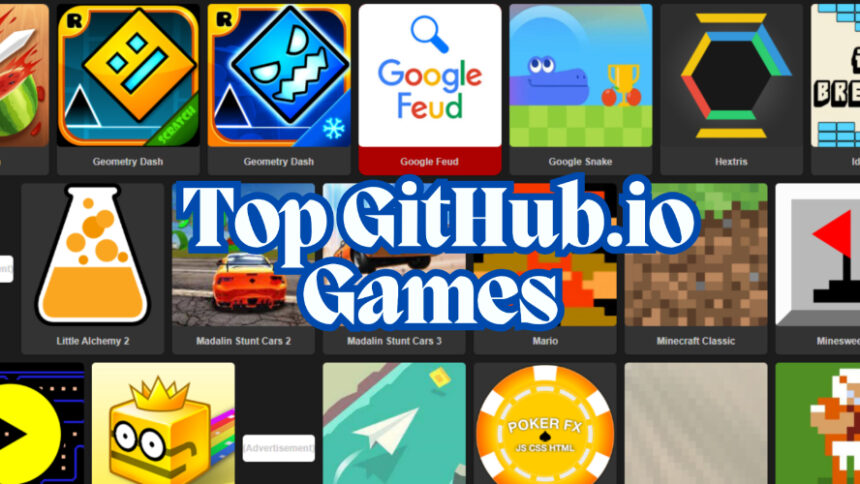Introduction to GitHub.io and its purpose
Welcome to the fascinating world of GitHub.io games! If you’re exploring the intersection of coding and creativity, you’ve stumbled upon a treasure trove. GitHub.io serves as a platform where developers can showcase their work, host personal portfolios, and even unleash fun games for others to enjoy. The rise of these web-based games is transforming how we think about programming—turning lines of code into interactive experiences that anyone can play.
Whether you’re a seasoned developer or just curious about tech culture, GitHub.io games offer something unique. They’re not just digital playgrounds; they are avenues for learning and experimentation in game development. Curious yet? Let’s dive deeper into what makes these games so special and how you can join in on the excitement!
The rise of GitHub.io games
The rise of GitHub.io games signals a shift in how developers and gamers interact. As accessibility to web development tools increases, more creators are turning their projects into browser-based experiences.
GitHub Pages offers an easy platform for publishing these games. With just a few clicks, developers can share their creations with the world. This simplicity has led to a surge of innovative ideas being transformed into playable formats.
These games often showcase unique mechanics and vibrant art styles, pushing the boundaries of traditional gaming norms. The community aspect thrives as players provide feedback and suggestions directly on platforms like GitHub.
Collaborations between coders also flourish here. Developers can remix or build upon existing projects, leading to rapid iterations and experiments that would be harder to achieve elsewhere. Each new game adds diversity to the growing landscape of GitHub.io offerings.
Popular GitHub.io games and their features
Among the most popular GitHub.io games, “2048” stands out. This classic puzzle game challenges players to combine numbered tiles until they reach 2048. Its simplicity and addictive nature keep users engaged for hours.
Another favorite is “Snake.” The revival of this retro game on GitHub showcases a straightforward interface with modern graphics. Users guide their snake to consume food while avoiding walls and its own tail.
For those who enjoy multiplayer experiences, “Slither.io” offers a competitive twist. Players control snakes and compete against others in real-time, aiming to grow larger while dodging opponents.
“The Coding Game” series merges gaming with programming skills. It allows players to solve coding puzzles in various languages, making it both educational and entertaining.
Each of these games highlights creativity and community involvement within the GitHub ecosystem, showing how developers can craft engaging experiences using simple web technologies.
How to play and create your own GitHub.io game
Playing a GitHub.io game is straightforward. Simply visit the game’s URL, usually formatted as username.github.io/repository-name. You can navigate through engaging visuals and interactive elements right from your browser without any downloads.
Creating your own GitHub.io game involves a few simple steps. First, sign up for a GitHub account if you haven’t already. Create a new repository with the naming convention of username.github.io to host your project.
Next, start coding! Use HTML, CSS, and JavaScript to bring your ideas to life. There are countless tutorials online that guide you through building games from scratch or enhancing existing templates.
Once you’re satisfied with your creation, push it live by committing changes in GitHub’s interface. Your game will be accessible globally under its unique URL within moments—ready for others to play and enjoy!
Benefits of playing and creating GitHub.io games
Playing GitHub.io games offers a unique blend of entertainment and education. Gamers can explore creative concepts that often push the boundaries of traditional gameplay. This exposure to innovative designs fosters critical thinking and problem-solving skills.
Creating your own GitHub.io game is equally rewarding. It allows developers, both beginners and experts, to showcase their programming abilities in an engaging format. By building these projects, individuals enhance their coding proficiency while learning new frameworks and tools.
Additionally, the collaborative nature of GitHub enables creators to connect with other developers worldwide. Sharing ideas leads to valuable feedback, inspiring further improvements in design or functionality.
Moreover, participating in this community encourages networking opportunities within the tech industry. You never know who might notice your game! Engaging with others also cultivates friendships amongst fellow gaming enthusiasts who share similar interests.
Criticisms and challenges faced by GitHub.io games
GitHub.io games, while innovative, are not without their criticisms. One major concern is accessibility. Not everyone has the technical know-how to navigate GitHub’s platform and create or play these games. This can lead to a divide between those who can easily participate and those who cannot.
Performance issues also arise frequently. Many of these games rely on browser performance, which can vary widely among users. Lagging graphics or slow loading times can detract from the gaming experience.
Additionally, there are concerns about security. Hosting a game on GitHub might expose developers and players to vulnerabilities if proper precautions aren’t taken.
Community support is often limited for emerging developers looking for feedback or collaboration opportunities within this niche space. These challenges highlight that while Github.io games hold promise, they still need refinement in various areas to reach broader audiences effectively.
Future of GitHub.io games
The future of GitHub.io games looks promising and vibrant. As more developers recognize the platform’s potential, creativity will flourish.
We can expect an influx of innovative game concepts that push boundaries. The integration of emerging technologies like AI and VR may redefine gameplay experiences too.
Collaboration among developers will likely grow as they share resources and ideas on GitHub. This sense of community can foster unique projects that blend different styles and genres.
As accessibility to coding improves, even non-programmers might dive into creating their own games using user-friendly tools available on GitHub.io.
Mobile compatibility could also become a focal point, allowing players to enjoy these games from anywhere at any time.
With continued support from both gamers and creators alike, GitHub.io may just transform into a hub for indie gaming culture in the coming years.
Conclusion
GitHub.io has carved a unique niche in the gaming world. It serves as an accessible platform for developers and gamers alike, showcasing creativity through simple web-based games. The rise of GitHub.io games highlights how technology enables collaboration and innovation.
The allure of popular titles lies not just in their gameplay but also in their community-driven development. Players can enjoy games created by others while having the opportunity to contribute or even create something new themselves. The process fosters learning, sharing, and camaraderie among users.
Creating a game on GitHub.io is straightforward thanks to abundant resources available online. Aspiring developers can harness their skills to design engaging experiences from scratch or build upon existing projects. This democratization of game development attracts varied talents.
Playing these games offers numerous benefits too—like sharpening problem-solving skills, enhancing quick thinking, and providing an entertaining break from daily routines. These interactive experiences often require minimal setup, ensuring easy access for players around the globe.
However, GitHub.io games face challenges such as quality control and visibility issues within a vast sea of projects. Not all creations receive equal attention; therefore, some noteworthy gems may go unnoticed amid countless offerings.
Looking ahead, it’s clear that GitHub.io will continue evolving as both a platform for aspiring gamemakers and as an arena where innovative ideas flourish into captivating entertainment options for everyone involved. Whether you’re playing or creating your own game here, the possibilities are endless—and that’s what makes github.io games truly exciting.










